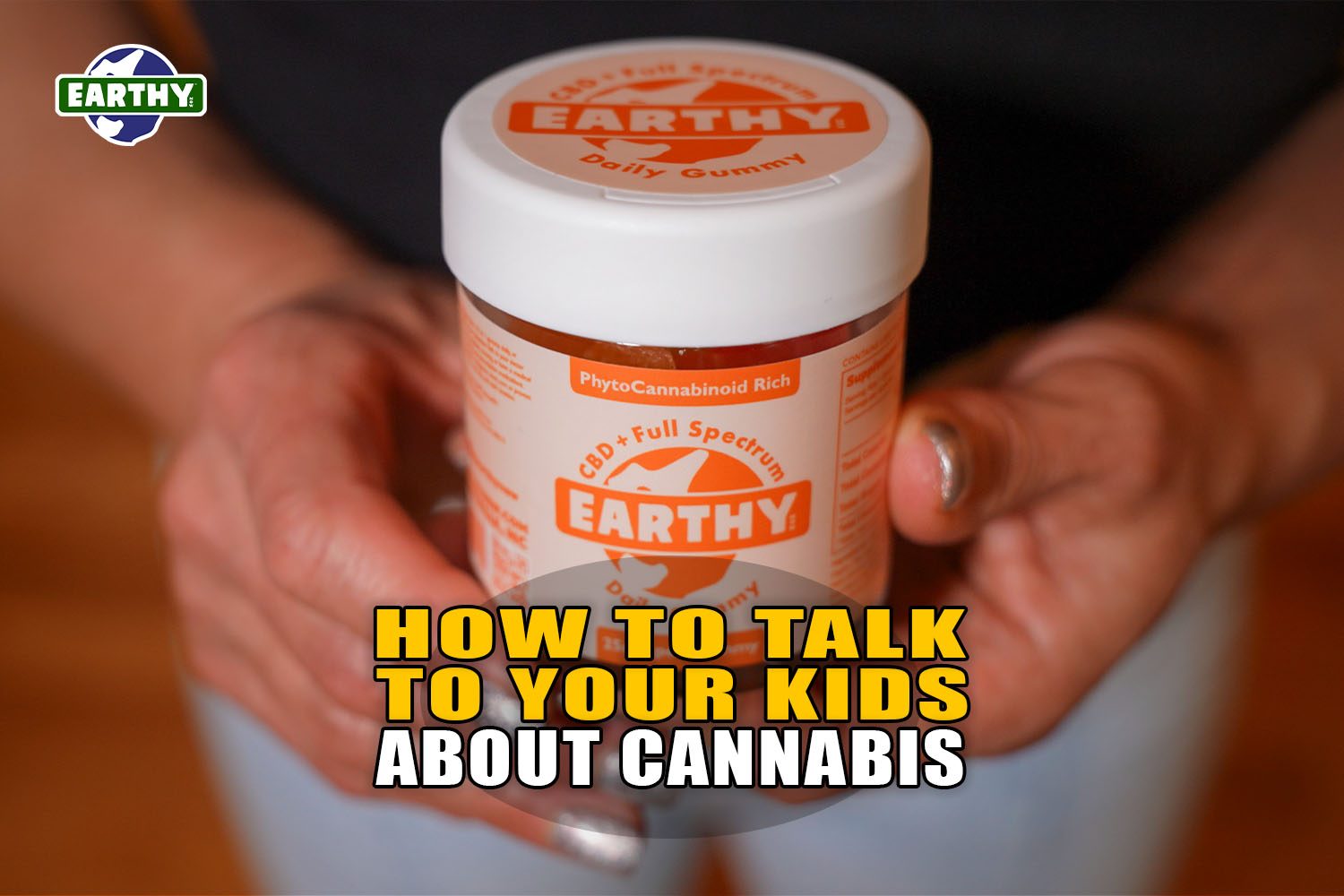With the changing landscape of cannabis laws and attitudes, it’s more important than ever for parents to have open and honest conversations with their kids about cannabis. For instance, understanding the complexities of cannabis use, in its various forms, is crucial in guiding children through their teen and young adult years.
Research tells us that early-age cannabis use can have long-term consequences on mental health, physical activity, and brain development [1]. This article aims to provide parents with the tools and knowledge to engage in constructive dialogue with their kids about cannabis use, prevention, and responsible decision-making.
Understanding cannabis
Before initiating the conversation, it’s essential for parents to educate themselves about cannabis. Cannabis, also known as hemp or marijuana depending on the amount of Delta-9 THC it contains, comes from the cannabis plant and can be used for many reasons, medical purposes, adult recreational use, wellness needs or more. Specifically, cannabis contains cannabinoids, such as THC, the psychoactive compound responsible for the “high” sensation people get from using it. In contrast, the cannabinoid CBD, also derived from the cannabis plant, offers potential wellness benefits without the psychoactive effects [2].
Overall, parents should understand the difference between hemp and marijuana, and their many products, such as edibles, smokables, and topicals, to better communicate the realities of the modern cannabis landscape. Also, it may help communication if parents get to know the tools people use to consume cannabis, such as water pipes, rolling papers, and vape pens, to address concerns effectively.
Understanding the Entourage Effect: How Full-Spectrum CBD Gummies Work
Addressing misconceptions
Common misconceptions about cannabis, including its legality, safety, and potential benefits, can cloud conversations with children. Thus, it’s crucial to dispel myths and provide accurate information about the risks and effects of cannabis use. For example, research shows that regular use can lead to cannabis use disorder, addiction, increased irritability, and withdrawal symptoms for some people. It’s important for kids to know the potential dangers. Also, parents must consider discussing the short-term and long-term consequences of cannabis use, including its impact on mental health, reaction time, and academic performance [3].
Understanding THC and CBD: The Key Components of Cannabis
Establishing communication
Creating a safe and non-judgmental environment is key to effective communication about cannabis. For example, encouraging open dialogue and asking questions can help parents understand their child’s perspective and concerns. Also, setting age-appropriate boundaries and discussing family rules regarding drug use can guide children in making informed decisions. Optimally, parents should lead by example and model responsible behavior, including avoiding modeling drug abuse and seeking help when needed [4].
Cannabis and Parenting: Balancing Use and Responsibilities
Talking points
When discussing cannabis with kids, parents should cover various topics, including the potential risks and benefits of cannabis use, legal implications, and personal values. Also, it’s essential to address peer pressure, societal influences, and the importance of making responsible choices. Parents can use real-life examples, research findings, and educational resources to support their conversation and reinforce key messages [4].
Consequences of Getting a Medical Card: Is It Worth It?
Strategies for effective communication
Active listening, empathy, and using age-appropriate language are essential strategies for effective communication about cannabis. For example, parents should be patient and understanding, allowing their children to express their thoughts and feelings without judgment. Offering resources, such as books, articles, and professional support, can further facilitate the conversation and address any concerns [5].
When is the best age to discuss cannabis with kids?
According to some experts, the best age to initiate conversations about cannabis with your kids is during their early teen years, typically around 12 or 13. At this age, many teenagers may start encountering peer pressure and curiosity about cannabis or drugs. By addressing these topics early on, parents can provide essential information about the risks and effects of cannabis, as well as its impact on brain development and mental health.
Setting a good example and establishing open communication to guide teens in making informed decisions is crucial. Additionally, discussing cannabis at this age allows parents to address concerns about peer influence, anxiety, and the potential effect on social skills. Waiting until later in adolescence or young adulthood may pose a greater risk as the brain continues to develop, making it more susceptible to the potentially dangerous effects of cannabis and other substances on a developing brain. Therefore, starting the conversation early provides a foundation for understanding and navigating the complexities of cannabis use in adulthood [6].
Handling challenging situations
Dealing with resistance or disagreement from children regarding cannabis use can be challenging for parents. However, remaining calm, patient, and persistent in addressing concerns and providing support is crucial. Also, parents should be prepared to seek professional help if their child shows signs of cannabis use disorder or other mental health issues. Encouraging healthy coping mechanisms, such as physical activity, hobbies, and social support, can help children navigate peer pressure and avoid drug abuse [6].
Avoid the Cross-Faded Effect: The Relationship Between Cannabis and Alcohol
The debate around punishment
The debate surrounding how to punish teens who experiment with or use cannabis is multifaceted. Indeed, there are arguments on both sides of the spectrum. Some advocate for a more lenient approach, focusing on education, prevention, and rehabilitation rather than punitive measures. They argue that punitive punishments such as criminal charges or expulsion from school can have long-lasting negative effects on a teenager’s future prospects. In other words, proponents of this strategy argue that punitive consequences might exacerbate the problem rather than solve it. Instead, they advocate for a more compassionate approach. For instance, they propose implementing interventions that address underlying issues such as peer pressure, mental health, and family dynamics while providing support and guidance to help teens make healthier choices [7].
On the other hand, there are those who argue for stricter consequences to deter teens from using cannabis, citing concerns about the potential risks and long-term consequences of its use. This camp believes that imposing harsh penalties sends a clear message about the seriousness of drug abuse and may serve as a deterrent for future use [8]. However, critics of this approach warn against the unintended consequences of heavily punitive measures, such as stigmatization and alienation, which may further isolate vulnerable teens and impede their ability to seek help [7]. Ultimately, the debate revolves around balancing punishment and support, ensuring that teens receive the necessary assistance to address underlying issues while holding them accountable for their actions.
CBD Gummies Review: Best CBD Gummies
The best hemp products for overall wellness
For adults seeking reliable, trustworthy sources of hemp-derived cannabis products, Earthy Now has something for everyone. These products are the industry’s cleanest and strongest, with only trace amounts of Delta-9 THC (no more than 0.3%). As always, Earthy Now provides the optimal balance of cannabinoids while ensuring low Delta-9 THC levels per federal guidelines. As a result, customers report various beneficial effects, from clear-headed alertness and energy to relaxation. Though some CBD products may be safe for kids, parents should keep all THC products safely out of reach of children and pets.
Explore these natural products to boost wellness:
- Gummies
- Lozenges
- Tablets (THC Free!)
- Soothing Relief Lotion
- Soothing Relief Salve
- Oils
- Flower
- Pet Products (THC Free!)
- Pre-Rolls
- Smokes
- Terpenes
Exploring the Benefits of CBD for Cats and Dogs
Key takeaway: how to talk to your kids about cannabis
Talking to kids about cannabis requires patience, understanding, and ongoing communication. By educating themselves, establishing open dialogue, and modeling responsible behavior, parents can empower their children to make informed decisions about cannabis use. It’s essential to address concerns, dispel myths, and provide support to ensure the health and well-being of young people in today’s complex world of substance use.
Visit Earthy Now for premium adult use cannabis products.
Interested in carrying Earthy products in your retail operation? Read: Unlocking the Potential of Hemp Flower Wholesale
Medical Disclaimer / Legal Disclaimer – Information is provided for educational purposes. It does not and is not intended to constitute legal advice or medical advice. We attempt to be accurate and up-to-date, but the legality of cannabinoids and the science of cannabis are evolving. The author is neither a legal professional nor a medical expert. Before buying or using any products, you should check with your local authorities and medical providers.
References
- Effects of Cannabis on the Adolescent Brain
- CBD vs. THC: What’s the Difference?
- Cannabis Use Disorder
- How to Talk to Teens About Cannabis (So They Won’t Ignore You)
- Talk to Your Kids About Marijuana
- Cannabis and Parenting: Navigating the Conversation
- Cannabis and Teens: Focus on Health, not Punishment
- What Are the Consequences If Your Teen Has Been Using Pot?




 Earthy Now
Earthy Now Earthy Now
Earthy Now